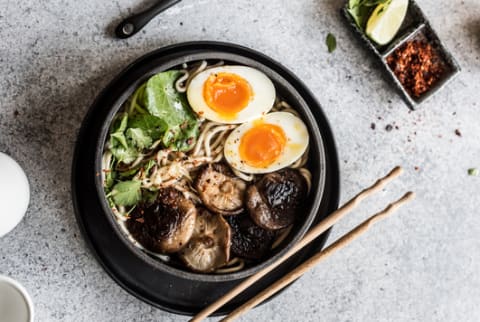Advertisement
Exactly What To Eat For A Happier, Less Painful Period


Menstrual pain is a common complaint from many of my patients. It can actually be debilitating for some women, causing them to miss work or important events, which can negatively affect their quality of life.
Traditionally a physician will prescribe pain medicine and birth control pills to ease the pain, but you can actually make a huge difference in the health and happiness of your periods simply with the food you eat. Try following these dietary guidelines, and see if it makes a difference before resorting to more drastic tactics.
Eat more healthy fats.
I encourage patients to incorporate a more anti-inflammatory or Mediterranean diet into their lifestyle. You can easily incorporate more foods containing omega-3 fatty acids into your overall diet or take a supplement if approved by your medical provider. Omega-3s decrease inflammation and the pain associated with menstrual cycles. You can get enough by eating two to three servings of cold-water fish (like salmon, sardines, or herring) per week, as well as enjoying plant-based sources like walnuts, green leafy vegetables, chia seeds, and eggs.
Top up your magnesium consumption.
Magnesium is a mineral many women are deficient in. Magnesium is one of my favorite recommendations to patients because it helps improve anxiety, sleep, and headaches in addition to cramping caused by menstrual dysfunction and pain. Magnesium helps relax the uterine muscles, which is where menstrual pain occurs. Foods rich in magnesium include cashews, soybeans, spinach, almond, halibut. Try incorporating a few of these foods the day leading up to and during your menstrual cycle.
Check for Vitamin B deficiency.
Many women also have a B1 or thiamine deficiency, which manifests in muscle pain, cramping, and sometimes fatigue, which are all symptoms of premenstrual syndrome. Lean pork, fish, dried beans, peas, and fortified cereals are all rich in vitamin B1, so eating them could help to alleviate these symptoms.
Vitamin B6 is also another vitamin that tends to be low, which can cause menstrual pain. Vitamin B6 helps get the magnesium into the cell, helping the uterus relax more. Fortified cereal, potatoes with skin, bananas, chicken breasts, and pork loins are also high in vitamin B6. Sometimes your medical provider will recommend a good complete B-complex vitamin, which includes both vitamin B1 and B6. But talk to your doctor before starting one on your own.
Add extra Vitamin E.
Vitamin E is a great anti-inflammatory supplement to include in your regimen. Its anti-inflammatory properties are actually what help ease period pain and can help balance your hormones and menstrual flow.
Try incorporating vitamin E-rich foods a couple of days before your cycle to prevent cramping and anxiety. Foods that are high in vitamin E include almonds, sunflower seeds, spinach, broccoli, kale, sweet potato, and avocado. Vitamin E is an antioxidant, which fights free radicals that cause aging, which is why it's also one of my favorite anti-aging secrets.
Want to see a day in the life of a period-friendly diet? Hormone expert Alisa Vitti takes you through the details, here.